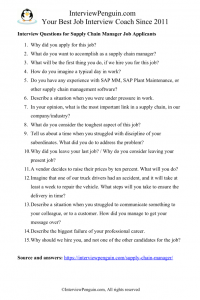Overseeing and managing supply chain and logistic strategy is a tough proposition. You will have a direct impact on the success, or failure of the company, and the employer will expect a lot from you. Your reward will be a six figure salary, and a job you can be proud of.
Good candidate for a supply chain manager position needs a mix of hard and soft skills. They need to be ready to handle the pressure, manage both people and resources, and take care of a variety of tasks on a daily basis. HR managers will ask you many questions in an interview, including technical and non-technical (which will prevail). Let’s have a look at the questions.
Table of Contents
Why did you apply for this job?
This is no entry level position. First and foremost you should refer to your experience in logistics and management. List your previous jobs that have prepared you for a position of supply chain manager.
Then you should ensure them that you believe to have all skills to handle the job, and understanding for the business of the company, their production process and supply chain. You can go one step further, saying that you believe to have an ability to continuously improve the efficiency of their logistics.
What do you want to accomplish as a supply chain manager?
This is a test of your attitude to work and business. In a good answer you should talk about achievements of the company (which you want to accomplish), and not your personal goals and dreams.
For example, you can say that you want to reduce the time between production and delivery to final customer by five percent, or that you want to reduce the overall costs related to logistics by ten percent. Or anything else that relates to the job.
Remember that managers and executives love numbers, they understand them, and they always think about the company as a business. Hearing that you want to reduce the expenses, or improve efficiency, is a music for their ears.
* May also interest you: Logistics Manager interview questions.
What will be the first thing you do, if we hire you for this job?
The answer differs when you apply for a job internally (progressing from a position of a logistics manager, or other similar job), and externally.
If you apply internally, you probably already have a good knowledge of each link in the supply chain, and have an idea of how to manage them and possibly improve the efficiency.
If you apply externally, however, your first step should be getting to know the people in the company, and the supply chain, in great detail. This and only this will allow you to manage it effectively, and to come up with ideas for its improvement.
How do you imagine a typical day in work?
Position of a supply chain manager is not strictly categorized. What exactly you will do depends on the hierarchy of the company, the number of assistants and subordinates you will have, and the complexity of their supply chain.
Consult the job description to understand better what will be expected from you. In most cases, you will collaborate with sales, production, and customer service teams, sometimes micro-managing the people, you will talk to vendors, negotiating conditions and prices, you will suggest solutions for process improvement, etc.
In any case, you should tell them that you like to be busy in work, and want to take initiative and actually bring some value to the company, on a daily basis.
Do you have any experience with SAP MM, SAP Plant Maintenance, or other supply chain management software?
Show some confidence in your answer. If you have no idea about the software, and have never worked with it before, tell them that you have excellent computer intelligence and will learn to work with the software in a matter of days or weeks.
And when you have experience, you can talk about various modules in the package, and how they helped you in managing the supply chain and logistics. Practical examples will help you to convince them of your proficiency with the software.
* May also interest you: Warehouse manager interview questions.
Describe a situation when you were under pressure in work.
Management bears responsibility. And with responsibility comes pressure. Show the interviewers that you do not crack under pressure, that you can prioritize your work, and will do your best to meet deadlines. Say that the pressure does not have a negative impact on your work and mental health.
You should do all of this while narrating a situation from the past. Remember that your attitude matters, not the particular situation you talk about.
It can be actually something very simple–a key employee missing in work and you had to replace him, a stop line you had to fix immediately, or just a certain production plan you had to deliver in a short time. Show them that you always do your best to manage the work in time, in any given circumstances.
Other questions you may get in your supply chain manager interview
- In your opinion, what is the most important link in a supply chain, in our company/industry?
- What do you consider the toughest aspect of this job?
- Tell us about a time when you struggled with discipline of your subordinates. What did you do to address the problem?
- Why did you leave your last job? / Why do you consider leaving your present job?
- A vendor decides to raise their prices by ten percent. What will you do?
- Imagine that one of our truck drivers had an accident, and it will take at least a week to repair the vehicle. What steps will you take to ensure the delivery in time?
- Describe a situation when you struggled to communicate something to your colleague, or to a customer. How did you manage to get your message over?
- Describe the biggest failure of your professional career.
- Why should we hire you, and not one of the other candidates for the job?
Special Tip: Download the full list of questions in a one page long PDF, and practice your interview answers anytime later (even when offline):

Conclusion and next steps
Experience plays a pivotal role in an interview for a supply chain manager job. Nevertheless, experience alone won’t win you this job contract.
In order to succeed, you will have to demonstrate right attitude to work, communication and management skills, and understanding for their business and supply chain. Prepare for the questions, research about the company, and don’t forget to show motivation and enthusiasm for the job. We wish you good luck!
May also interest you:
- Logistics manager interview questions.
- Plant manager interview questions.
- Farm manager interview questions.

